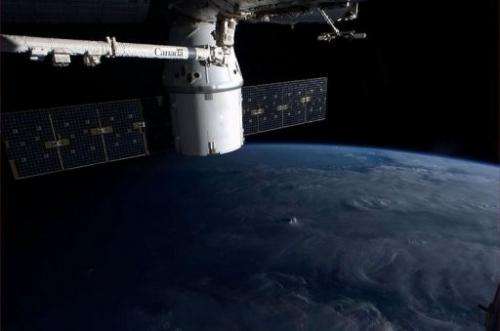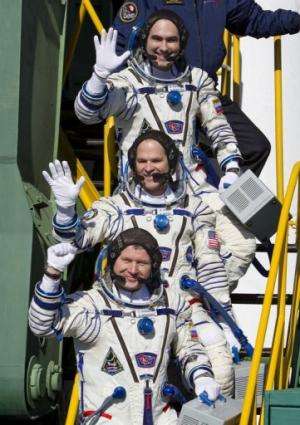A NASA image taken on the International Space Station shows part of the ISS and Earth, on March 9, 2013. Three astronauts have returned safely to Earth from the ISS, aboard a Russian capsule which landed on the freezing Kazakhstan steppe, mission control said.
Three astronauts returned safely to Earth from the International Space Station early Saturday, aboard a Russian capsule which landed on the freezing Kazakhstan steppe, mission control said.
"There is landing!" flashed a Russian mission control centre message transmitted by NASA. Rescue teams rushed to recover the capsule carrying NASA US astronaut Kevin Ford and Russian cosmonauts Oleg Novitskiy and Evgeny Tarelkin.
"The crew felt normal through the descent and landing, their mood is good," Russian agencies quoted the Russian mission control official commentator as saying.
It was the first space mission for the Russian cosmonauts, and the second for astronaut Ford, who was captain of the crew. They arrived at the space station in October.
Russian space agency Roscosmos confirmed the landing time as 0305 GMT. "The landing was completed as planned," it said in a statement. "The crew is feeling good. In the coming hours, they will be transported to a permanent location for post-flight rehabilitation."
Saturday's landing had been delayed by a day due to poor weather conditions, but rescue helicopters still had to contend with thick ground fog which descended on the landing area and drastically reduced visibility.
The spherical Soyuz vessel landed upright and four workers were shown prying the hatch open to extract the three men. They pulled the crew members out of the capsule and helped them down a special slide.
Russian cosmonaut Evgeny Tarelkin pumped his fists as he sat on the edge of the capsule. The smiling men were then bundled up by the Russian rescue workers and sat recovering in special chairs.
They were rushed into a helicopter within minutes of arrival to escape the subzero temperatures, as no medical tent was brought to the location by the skeleton evacuation crew that braved nearly zero visibility, the NASA commentator said in footage broadcast online by NASA-TV.
NASA later uploaded a photo of the trio giving a collective thumbs-up at Kazakhstan's Kustanay airport, near Russia's border. Ford was holding an apparent departure gift on his lap: a traditional Russian nesting doll painted as an astronaut.
The International Space Station (ISS) crew members, US astronaut Kevin Ford (C) and Russian cosmonauts Oleg Novitskiy (bottom) and Evgeny Tarelkin (top) wave as they board the Soyuz TMA-06M spacecraft at the Russian leased Kazakhstan's Baikonur cosmodrome, on October 23, 2012, shortly before their launch.
"The crew that landed today, they have an aura of a united, friendly team," said Roscosmos chief Vladimir Popovkin in a televised press conference. "I think they have a great future in space."
The crew encountered no problems during their 143 days in space, where they conducted 34 scientific experiments, he added. "What will this crew be remembered by? That everything went as planned during their flight," he said.
The Soyuz TMA-06M Russian spacecraft had separated from the ISS on schedule and entered the earth atmosphere at about 0240 GMT.
"Just closed the hatch on the departing crew. The echo rang through the Station in many ways, we are now 3 onboard this huge ship. So cool," tweeted Chris Hadfield, a Canadian astronaut who is now captain of the remaining ISS crew members, NASA astronaut Thomas Marshburn and Russian cosmonaut Roman Romanenko.
The current team will remain in space until May. They expect to be joined by Russian cosmonauts Pavel Vinogradov and Alexander Misurkin and NASA astronaut Christopher Cassidy, who will be sent into space later this month.
Since 2009 there have been teams of six astronauts and cosmonauts aboard the space station, whose capacity was previously limited to only three people.
Soyuz spacecraft, used since 1967, are currently the only way to ferry astronauts to the ISS after the US retired its iconic space shuttle programme in 2011.
Russia has suffered several recent setbacks in its space program, notably losing expensive satellites and an unmanned supply ship to the ISS last year, but the manned missions have been flawless.
(c) 2013 AFP























